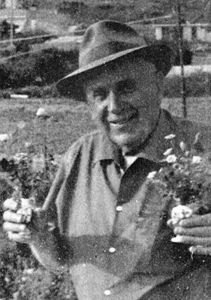Floriculturist, Photographer
 He was born in Sanremo on 27 August 1889 to Domenico and Maria Alborno.
He was born in Sanremo on 27 August 1889 to Domenico and Maria Alborno.
As a child he helped his father in the photographic studio in Corso Garibaldi and from his father, who lovingly looked after the small garden behind the studio in his spare moments, came the love for flowers that was to accompany him throughout his life.
In 1910 he joined a film company and during the First World War he took part in the conflict as a photographer.
After the war he still worked in his father's studio but since 1922 he dedicated himself completely to the cultivation of flowers and the first hybridization experiments in his father's small estate in Cape Verde.
In 1925 he met Domenico Aicardi with whom he formed a fraternal friendship.
From the first Mansuino followed the classical tradition of hybridization, but in 1945, having for long meditations and studies, he reached the conviction of the negative consequences that the process of decay of the hybrids used has on the work of cross-breeding and that only by going back to the raw material of the botanical species, it is possible to carry out a work destined to valuable realizations, he abandoned the work criteria carried out until then to direct his experiments on a new revolutionary line of research.
This gave rise to infinite new varieties of flowers and especially new breeds of roses: the Mansuinian roses (Red Flare and Aida).
From the highest authorities on the subject, Mansuino received countless awards, his experimental floriculture company received delegations sent by foreign governments, university professors and scholars.
Among the major prizes at the Floral Exhibitions are: the Rome prize for the best rose (1960), the first Grand Prix Sanremo for Golden Carnation (1960), the First Prize Monza for the most beautiful Italian rose (1967), the First Prize for the Italian Carnation Montecarlo (1967), the First Prize at the International Floralies in Paris for the most beautiful group of multicoloured roses (1969), gold medal at Monza for the rose "Superba" (1970).
On 13 October 1969 he was awarded the title of "Citizen well deserved".
On 11th June 1981 he died in Sanremo.
(source: Marco Mauro)




